Transforming Lives
A Teenager Starts School Thanks to USAID
For many children in the 40 new unregistered migrant settlements outside of Bishkek, the capital of Kyrgyzstan, access to school is restricted by poverty and a lack of legal residency. Mamasabyt Raiyimberdy uulu is one of these children. At 13, he was illiterate and had never attended school because he needed to work in the bazaar to make money for his family. To add to the meager wages his mother earned by selling bananas, Mamasabyt needed to earn about $4 per day, which he did by collecting and selling used boxes.
To reach out to kids like Mamasabyt, USAID has started providing small grants to non-governmental organizations (NGOs) working in these settlement areas. One of the 10 participating NGOs, the Councils for Human Rights, organized a two-month Summer Education Camp for 21 school dropouts from six new settlements around Bishkek. These camps aimed to provide access to a friendly learning environment for children from socially vulnerable families, as well as to create a positive environment for studying, playing sports, helping each other and making friends.
The 2010 earthquake in Haiti disrupted bank, microfinance institution, credit union, and remittance paying agent operations. Access to financial services required even greater travel time and longer waits due to damaged roads and destroyed financial institution buildings. The need for convenient, secure and affordable financial services became more apparent than ever.
In response, USAID and the Bill & Melinda Gates Foundation pioneered the Haiti Mobile Money Initiative (HMMI). HMMI provides incentives to encourage private sector development of mobile money services in Haiti, where only an estimated 15 percent of Haitians have access to financial institutions. At the end of 2010, through mobile phone companies Digicel and Voila, the initiative launched two mobile money services, TchoTcho Mobile and T-Cash. Clients are now able to make payments, send and receive transfers, and keep balances safely and conveniently on their mobile phones.
While pregnancy and childbirth are traditionally the domain of Filipino women, decisions surrounding these issues are often strongly influenced by their male partners. Recognizing the role of men in household decision making, USAID spearheaded a congress on family health to encourage and reinforce male involvement in family planning and maternal and child health. The Alban Men's Congress, dubbed “Macho Talk: Responsible Father, Caring Husband,” took place in Tabaco City in 2010 with 110 male participants—local officials, teachers, farmers, fishermen, vendors and others.
“I stopped cultivating rice several years ago because it just didn’t grow well,” said farmer Mamadou Coulibaly. “When I learned about NERICA from USAID, I took up rice production again.”
Twenty-year-old Hrayr Kurdian was born and raised in Aanjar, a town in Lebanon’s Bekaa Valley. He has always loved the outdoors and prefers spending time in nature to surfing the Internet or playing video games like other young adults.
Kurdian moved to Beirut hoping to work, but found it difficult to adapt to urban life and missed Aanjar's natural surroundings. He ended up moving back to Aanjar but struggled to find work. With only 2,400 residents in the winter, the community offered few opportunities.
Michel Dorlean, a Haitian horticulturalist, grew up learning the family business of planting and growing flowers on hillside plots in his mountainous hometown of Furcy. Despite all the intensive work that goes into cultivating flowers, Dorlean and many other local flower producers struggled each year to reach their full earning potential. Today, thanks to assistance from Feed the Future, Dorlean is the president of a flower growers’ association in Furcy that generates US$18,000 per year. The project, implemented through USAID, is teaching smallholder farmers like Dorlean and his association how to use greenhouse agriculture to produce a higher quantity and quality of crops on smaller areas of land.
With an estimated 52 million cattle, 36 million sheep, 35 million goats and 5 million camels in 2009, Ethiopia has Africa’s largest livestock population. Pastoralist communities are highly dependent on income from livestock to pay for food, health services and school fees. Since 2005, USAID has supported the Global Livestock Collaborative Research Support Program to create a National Livestock Market Information System (NLMIS) in Ethiopia. The NLMIS helps Ethiopian pastoralists make better decisions on when to sell their livestock and earn increased income during times of economic hardship.
USAID is working with Palestinian agricultural producers and agribusinesses to identify opportunities to increase those profit margins at all levels from field to fork. One such opportunity, in which local farmers are adjusting the varieties of vegetables they grow to best meet the needs of a frozen food processor, has the potential to create almost 500 additional jobs in the farming sector and generate more than $1.8 million in annual revenues for the farmers.
The herders of south-central Iraq have traditionally let their sheep graze on the land. But grass and reeds are scarce and the animals are often small when taken to market. Ahmad Alsaabari, an engineer by training, had read about the success of Western foodlots and recognized the opportunity when the U.S. Agency for International Development (USAID) proposed founding of a demonstration facility in Babil Province, where lambs are considered among the best in Iraq.
In Bohol province in the Philippines, a weary mother watched as a midwife approached the rickety hospital bed where she sat. Her newborn lay feverish in a corner at the edge of the bed beside two other newborns and their mothers; one infant possibly with a rising infection. This was typical in government-owned hospitals, but for Corazon "Azon" Paras, the attending midwife, it did not seem fair that mothers and their infants should be in this plight.
Born to a poor family herself, Paras knew the frustration of not being able to afford quality health care. Upon becoming a registered midwife, she began her career caring for the poorest of communities in Bohol. At the government hospital, Paras worked within the limits of the public health system. Congestion was one of the pressing challenges.
Women in rural Liberia are often unaware that Liberian divorce law grants them the right to half of all property amassed during marriage. Even if they know about the law, many women are deterred by the high costs and social stigma associated with taking a case to formal courts. With support from USAID, the Carter Center and Catholic Justice and Peace Commission now support 45 community legal advisors in seven counties around Liberia. Approximately half of all cases involve female clients. Through this program, USAID is helping to make the rule of law a reality for ordinary Liberians, often for the first time.
Pages
Last updated: October 17, 2012

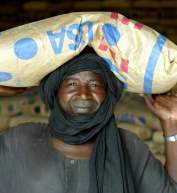
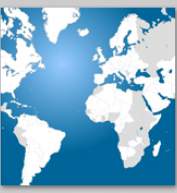

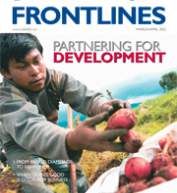
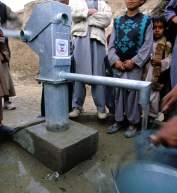
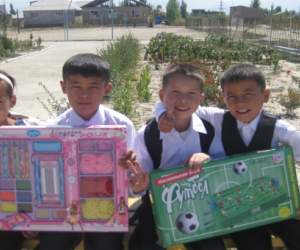
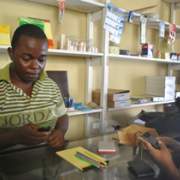
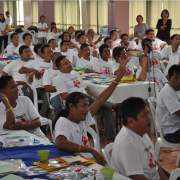
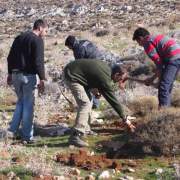
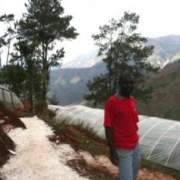
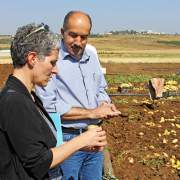
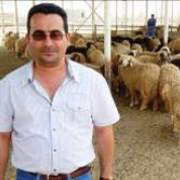
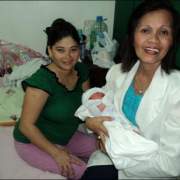
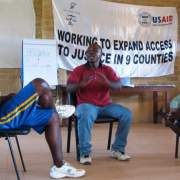
Comment
Make a general inquiry or suggest an improvement.